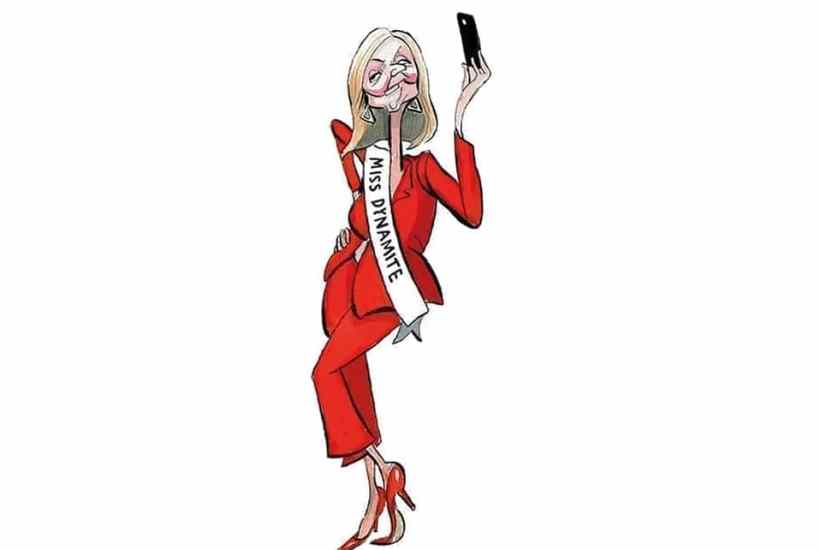One of the most important ingredients in the oil used to anoint King Charles during his coronation is becoming a bit of an issue – and it may give us a signal as to what sort of monarchy lies in wait for us. Aside from cinnamon and ambergris, the oil also includes musk from the Ethiopian civet cat, obtained through what protestors suggest is a cruel process. The oversized weasel is constrained in a tight cage made of twigs and its bum is forced out of a hole at the back of a cage, whereupon skilled Ethiopian musk gatherers squeeze the animal’s perineal glands, reaping a rich harvest of noisome oil and making the civet cat wish that it had been born in, say, Denmark.
The question is: will our new King, for the sake of tradition and continuity, accede to this procedure or, as a concerned and modern monarch, will he do something different? Perhaps he will talk to the civet cat and persuade it to donate some of its valuable musk in a democratic and consensual manner. Or maybe he will choose to use a substitute for the oil – possibly utilising the cream sauce from a Sainsbury’s Taste the Difference Italian–style ham and mushroom tagliatelle. Whatever, the oil will be poured upon Chas from the beak of an extremely badly rendered golden eagle, a vessel still referred to as an ampulla. Personally I think they should train a real golden eagle for this part of the ceremony, as the one they have got looks stupid and nothing like an eagle at all. It more closely resembles a rooster which has just escaped from a fight with a pit-bull terrier. A proper golden eagle would add a certain drama to the proceedings. Anyway, these are just some of the loose ends that must be tied up before the ceremony next May.
Before then I expect we will have to endure another coronation, as the Conservative party must surely by now have given up on its disastrous experiment with democracy. Someone smarmy and emollient who you wouldn’t trust with your spoons will be our next prime minister, and the wishes of the party – and perhaps the electorate – will have been ignored altogether.
We are in the position we are in as a consequence of a leadership contest which was perverse, hideously boring and in the end catastrophic. At the outset, nobody on God’s earth wanted Liz Truss to win. Not the MPs, not the party members. The party members wanted Boris Johnson, I suspect, and failing that perhaps Suella Braverman or Kemi Badenoch. The elected members wanted Rishi Sunak. The early stages of the interminable contest, in which six challengers were evicted, were too short. Had the activists and the general public heard a little more from the likes of Braverman, Badenoch or even the clever and likeable Tugendhat, and had these candidates been granted the time to advance their credentials, things might have been different. Instead, Sunak and Truss bored their way to the final showdown and Truss won simply because she was more right-wing than Rishi, even if those who voted for her realised that she was nuts. But nobody really wanted the woman – as evidenced, I think, by the much closer final result than many had previously predicted.
As Matthew Parris pointed out in this magazine (rather gleefully, I thought), the MPs had no vote when it came down to the two finalists, which does seem perverse. By the same token, the MPs lacked the imagination (or the background knowledge) to get behind a candidate who might have been able to communicate with the electorate, in the manner of a Tugendhat or Badenoch.
I say that nobody on God’s earth wanted Truss – but even fewer wanted the man we have as de facto prime minister. Jeremy Hunt was the worst of all possible worlds, and was of course the first candidate to be unceremoniously booted out of the contest. His popularity with the activists was even lower than it was with MPs – and now he is there, with that remarkably smug expression, dictating the government’s programme.
The party members and the general public have every right to be angry that what amounts to a coup has been staged, and Labour is correct to suggest that the most honest way out of this debacle is a general election. But I suspect we will not have one.
A point so far ignored in what the Americans, with their knack for the vernacular, call a goat-fuck, is the degree to which the government’s enormous majority contributed to its downfall. It is always said that the best outcome of an election is a healthy majority, so that a government can push through its programme with decisiveness and rapidity. But it is almost always the case that a large majority induces in the government an intense and abiding stupidity, and leads it toward making very bad decisions.
Two states of mind manifest themselves in a government with a large majority. First, complacency – which is surely the reason Johnson is no longer our prime minister. The Johnson administration was riven with complacency and continued to be so even as the opinion polls gave the Labour party a larger and larger lead. The second is arrogance – they think they can get away with doing whatever the hell they want. This was certainly the case with Theresa May, who was so cosseted by her moderate majority that she thought she could foist another general election on a very surly public.
It was true of Blair’s government, which started bossing the Queen around and launching illegal wars. And it was true of Liz Truss’s somewhat brief tenure – a majority of 70 or so giving her the impression that it would be OK to disinter the corpse of Fried-rich Hayek and wave him triumphantly at a disbelieving electorate (and the markets).
A parliamentary majority of about ten is the best bet for ensuring that a government is kept on its toes and behaves with a degree of humility.
Got something to add? Join the discussion and comment below.
Get 10 issues for just $10
Subscribe to The Spectator Australia today for the next 10 magazine issues, plus full online access, for just $10.
You might disagree with half of it, but you’ll enjoy reading all of it. Try your first month for free, then just $2 a week for the remainder of your first year.















Comments
Don't miss out
Join the conversation with other Spectator Australia readers. Subscribe to leave a comment.
SUBSCRIBEAlready a subscriber? Log in